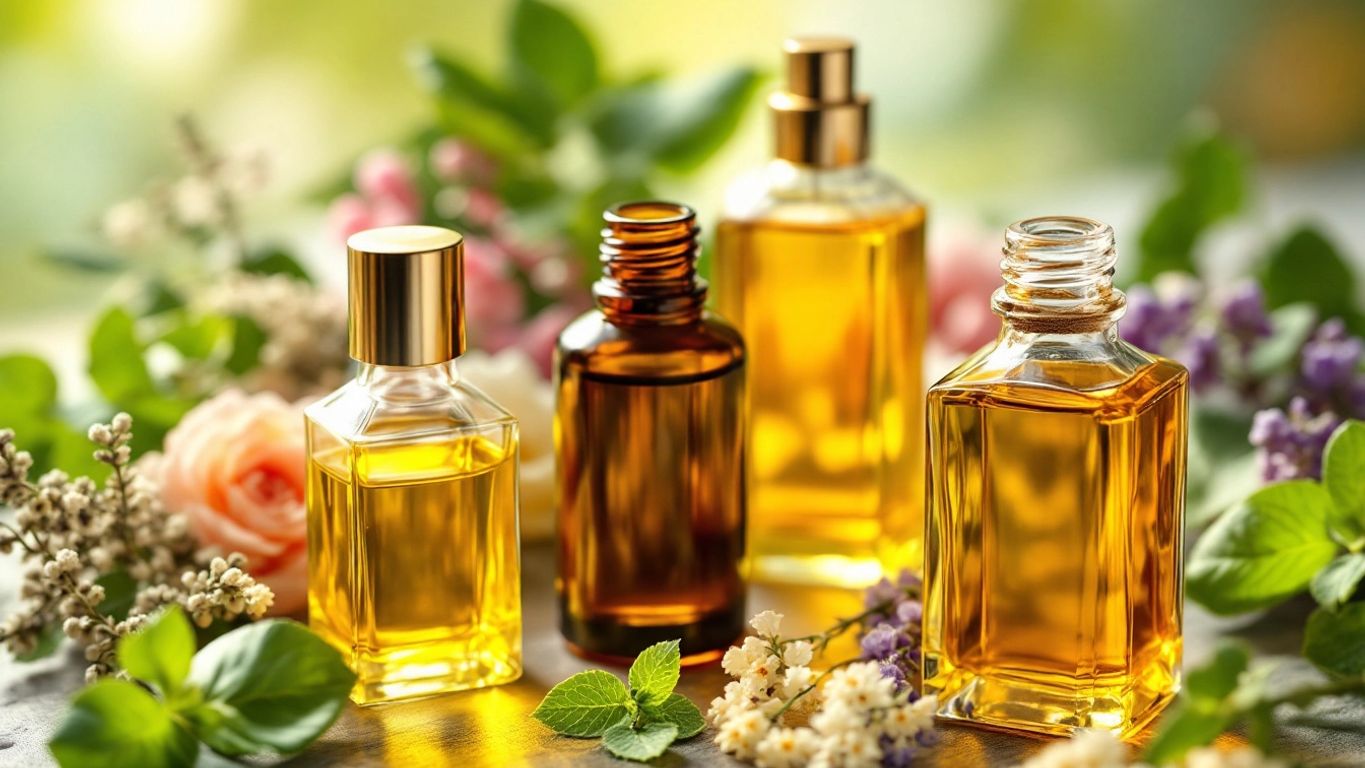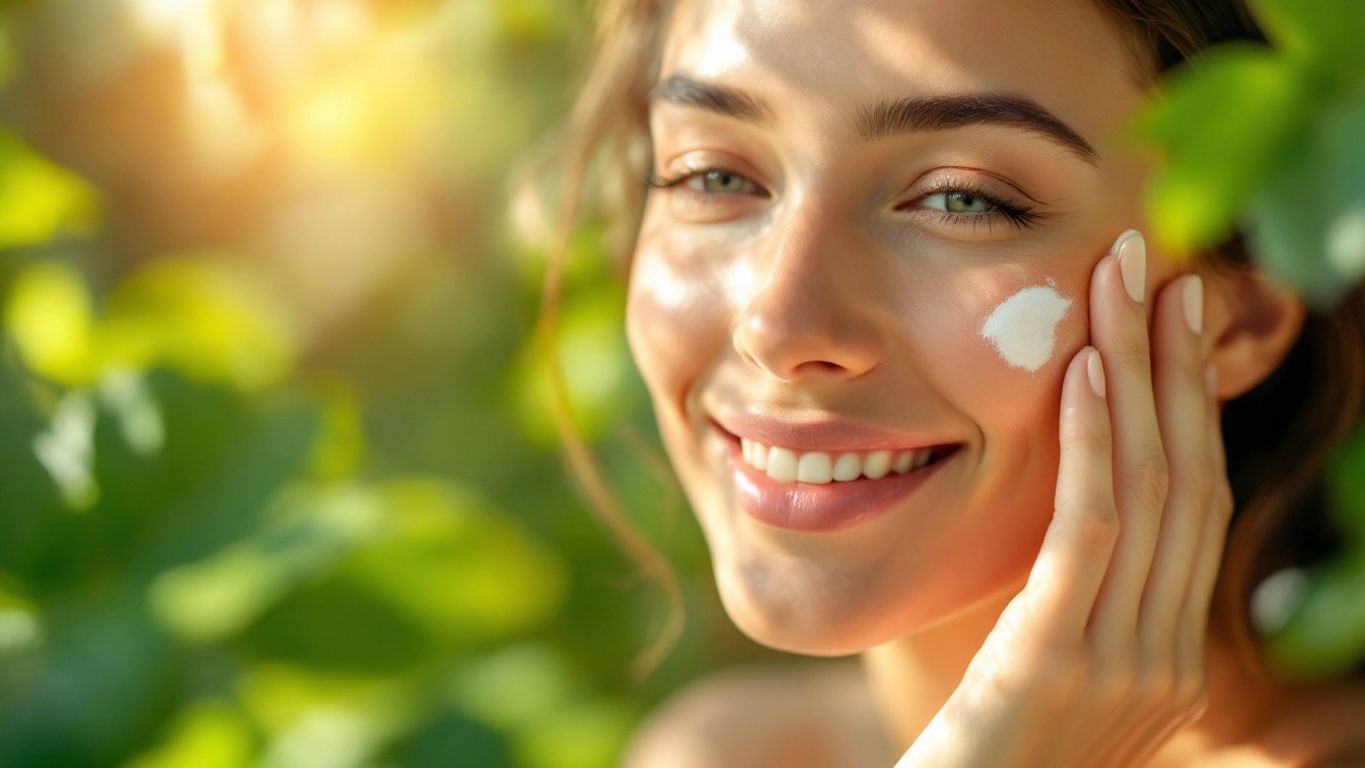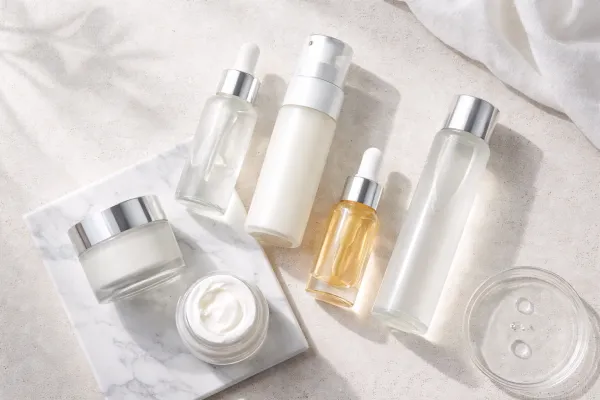Unlocking Radiant Skin: The Ultimate Guide to Essential Oils for Skincare
Discover how essential oils can transform your skincare routine for radiant, healthy skin!

Essential oils are becoming popular in skincare for their natural benefits.
This guide will explore how these oils can help you achieve radiant skin. From understanding what essential oils are to discovering the best types for your skin, this article covers everything you need to know.
You'll learn how to safely use essential oils and incorporate them into your skincare routine for the best results.
Key Takeaways
- Essential oils are natural extracts that can improve skin health.
- Different oils work best for different skin types, such as oily, dry, or sensitive.
- Always dilute essential oils before applying them to your skin.
- Patch testing is important to avoid allergic reactions.
- Incorporating essential oils into your routine can enhance your overall skincare experience.
Understanding Essential Oils for Skincare
What Are Essential Oils?
Essential oils are concentrated plant extracts that capture the natural fragrance and beneficial properties of plants.
They’re like nature’s little powerhouses!
These oils can be used in various ways, from aromatherapy to skincare. When we apply them to our skin, they can help with hydration, soothing, and even healing.
How Essential Oils Benefit the Skin
Using essential oils in our skincare routine can lead to amazing results.
Here are some benefits:
- Hydration: Oils like argan and jojoba can deeply moisturize our skin.
- Healing: Oils such as tea tree and lavender can help with acne and irritation.
- Anti-aging: Some oils, like rosehip, are packed with antioxidants that fight signs of aging.
Common Myths About Essential Oils
There are a lot of misconceptions about essential oils. Let’s clear a few up:
- All oils are safe: Not all essential oils are suitable for everyone. Some can cause irritation.
- More is better: Using too much can lead to adverse effects. A little goes a long way!
- They replace skincare products: Essential oils are great, but they should complement, not replace, our regular skincare routine.
Remember, essential oils can be a fantastic addition to our skincare, but we should always do our research and patch test before diving in!

Top Essential Oils for Different Skin Types
When it comes to skincare, we all know that not all oils are created equal. Each skin type has its own needs, and finding the right essential oil can make a world of difference.
Here’s a fun breakdown of the best oils for different skin types:
Best Oils for Oily Skin
- Tea Tree Oil: Known for its antibacterial properties, it helps fight acne and reduces excess oil.
- Jojoba Oil: This oil mimics our skin's natural sebum, making it great for balancing oil production.
- Grapeseed Oil: Lightweight and non-comedogenic, it hydrates without clogging pores.
Best Oils for Dry Skin
- Argan Oil: Packed with vitamin E, it deeply moisturizes and nourishes dry skin.
- Coconut Oil: A classic favorite, it provides intense hydration and has antibacterial properties.
- Rosehip Oil: Rich in essential fatty acids, it helps repair and rejuvenate dry skin.
Best Oils for Sensitive Skin
- Roman Chamomile Oil: This oil is anti-inflammatory and soothing, making it perfect for calming irritated skin. It’s great for all skin types, especially sensitive ones.
- Marula Oil: Gentle and nourishing, it hydrates without causing irritation.
- Lavender Oil: Known for its calming effects, it also helps soothe redness and irritation.
Skin Type | Recommended Oils |
|---|---|
Oily | Tea Tree, Jojoba, Grapeseed |
Dry | Argan, Coconut, Rosehip |
Sensitive | Roman Chamomile, Marula, Lavender |
Remember, finding the right oil is key to unlocking your skin's potential! Experiment with these oils to see what works best for you. Happy oil hunting!
How to Incorporate Essential Oils into Your Skincare Routine
Creating a Simple Routine
When we think about adding essential oils to our skincare, it’s all about keeping it simple. Here’s how we can do it:
- Choose the right oil for your skin type. For example, if you have oily skin, lighter oils like jojoba are great. For dry skin, heavier oils like argan work wonders.
- Apply the oil on damp skin after cleansing. This helps lock in moisture and makes the oil absorb better.
- Use just a few drops! A little goes a long way, and we don’t want our skin feeling greasy.
Layering Essential Oils with Other Products
We can also mix essential oils with our favorite products:
- Moisturizers: Add a drop or two to your daily moisturizer for an extra boost of hydration.
- Serums: Combine oils with serums to target specific skin concerns, like aging or dullness.
- Makeup: Use facial oil as a primer for a dewy finish before applying makeup.
DIY Essential Oil Recipes
Feeling crafty? Here are some fun DIY recipes:
- Hydrating Face Mist: Mix water, a few drops of lavender oil, and a splash of aloe vera. Perfect for a refreshing spritz!
- Nourishing Body Oil: Combine sweet almond oil with a few drops of rose oil for a luxurious body treatment.
- Soothing Bath Oil: Add a few drops of chamomile oil to your bath for a calming experience.
Remember, incorporating essential oils into our routine is a journey. It’s all about finding what works best for our skin and enjoying the process!
Safety Tips for Using Essential Oils

Patch Testing and Dilution
When we start using essential oils, it’s super important to patch test first.
This means applying a small amount of diluted oil on a small area of skin to see how our skin reacts.
Remember, diluting essential oils is key! A good rule of thumb is to keep concentration levels below 5%.
For example, diluting at 1% is like adding 6 drops of essential oil to 1 ounce of carrier oil. This helps prevent any unwanted reactions.
Avoiding Photosensitivity
Some essential oils can make our skin more sensitive to sunlight, which is called photosensitivity.
Oils like bergamot and lemon can cause skin irritation when exposed to UV rays. To stay safe, we should avoid using these oils before heading out in the sun. If we do use them, let’s make sure to apply them at night instead!

Recognizing Allergic Reactions
It’s crucial to be aware of how our skin responds to essential oils.
If we notice any redness, itching, or swelling, it’s a sign that we might be having an allergic reaction. In such cases, we should stop using the oil immediately and consult a healthcare professional if needed. Keeping track of our skin’s reactions can help us enjoy the benefits of essential oils without any worries.
Always remember, safety first! By following these tips, we can enjoy the amazing benefits of essential oils while keeping our skin happy and healthy!
The Science Behind Essential Oils

How Essential Oils Are Extracted
When we think about essential oils, we often wonder how they’re made. Most essential oils come from plants, and the extraction process is pretty cool!
Here are the main methods:
- Steam Distillation: This is the most common method. Steam passes through the plant material, causing the oils to evaporate. The steam is then cooled, and the oil is collected.
- Cold Pressing: This method is mainly used for citrus oils. The peels are pressed to release the oils.
- Solvent Extraction: This is used for delicate flowers. A solvent extracts the oil, which is then separated from the solvent.
The Role of Terpenes and Antioxidants
Essential oils are packed with terpenes and antioxidants, which are super important for our skin. Here’s why:
- Terpenes: These compounds give essential oils their unique scents and can help with skin absorption.
- Antioxidants: They fight free radicals, which can damage our skin. This means essential oils can help keep our skin looking youthful!
Scientific Studies on Essential Oils
There’s a lot of research out there about essential oils.
Some studies show that certain oils can help with skin conditions like acne and eczema. For example, tea tree oil is known for its antibacterial properties, making it a favorite for oily skin types.
However, we should always remember that not all essential oils are safe for everyone. Some can cause irritation or allergic reactions, so it’s important to do a patch test before using them.
In our journey to radiant skin, understanding the science behind essential oils helps us make informed choices about what we put on our skin.
Essential Oil | Main Benefit | Skin Type |
|---|---|---|
Tea Tree | Antibacterial | Oily |
Lavender | Calming | Sensitive |
Jojoba | Moisturizing | Dry |
So, let’s embrace the power of essential oils while being mindful of their effects on our skin!
Aromatherapy and Skincare

Benefits of Aromatherapy for Skin
Aromatherapy is not just about nice smells; it can actually do wonders for our skin!
Using essential oils in our skincare routine can enhance our overall skin health.
Here are some benefits:
- Relaxation: The soothing scents can help us unwind, reducing stress that often shows up on our skin.
- Healing Properties: Many essential oils have healing qualities that can help with skin issues like acne or dryness.
- Hydration: Some oils can lock in moisture, keeping our skin hydrated and plump.
Popular Essential Oils for Aromatherapy
When it comes to essential oils, there are a few favorites that we can easily incorporate into our skincare.
Here’s a quick list:
- Lavender: Great for calming and soothing irritated skin.
- Tea Tree: Known for its antibacterial properties, perfect for acne-prone skin.
- Rosemary: Helps improve circulation and can brighten our complexion.
Combining Aromatherapy with Skincare
To get the most out of our skincare routine, we can combine aromatherapy with our favorite products. Here’s how:
- Add a few drops of essential oil to your moisturizer for an extra boost of hydration.
- Use essential oils in a diffuser while applying your skincare to create a calming atmosphere.
- Mix oils into DIY masks for a fun and effective skincare treatment.
Let’s remember that aromatherapy is all about enjoying the process! By incorporating these oils, we can not only pamper our skin but also uplift our spirits.
In conclusion, using essential oils in our skincare routine can be a game-changer. They not only help our skin but also make our self-care rituals more enjoyable!
Choosing the Right Essential Oil for Your Skin Type

Identifying Your Skin Type
Understanding our skin type is super important! It helps us pick the right essential oils that will work best for us. Here’s a quick guide:
- Oily Skin: Shiny and may have enlarged pores.
- Dry Skin: Feels tight or flaky, often looks dull.
- Sensitive Skin: Easily irritated, may react to products.
Matching Oils to Skin Concerns
Once we know our skin type, we can choose oils that target our specific needs. Here are some great options:
Skin Type | Recommended Oils |
|---|---|
Oily | Jojoba, Tea Tree, Grapeseed |
Dry | Argan, Rosehip, Coconut |
Sensitive | Chamomile, Marula, Lavender |
Tips for Buying Quality Essential Oils
When shopping for essential oils, keep these tips in mind:
- Look for pure oils: Check labels for 100% pure essential oils.
- Avoid synthetic fragrances: These can irritate our skin.
- Choose reputable brands: Research brands to ensure quality.
Remember, finding the right essential oil can make a huge difference in our skincare routine! It’s all about matching the oil to our skin’s unique needs. Let’s embrace the power of essential oils for that radiant glow!
Final Thoughts on Essential Oils for Radiant Skin
Essential oils can be a game-changer for your skincare routine.
They’re not just fancy products; they can really help your skin feel and look amazing.
Remember, it’s all about finding the right oils for your skin type and using them the right way. Don't rush the process—give your skin time to adjust and see the results.
Enjoy the journey to glowing skin, and have fun experimenting with different oils. Your skin will thank you!
Essential Oils for Skincare FAQ
What are essential oils and how do they benefit the skin?
Essential oils are concentrated extracts derived from plants, capturing their fragrance and beneficial properties. When applied to the skin, they offer numerous benefits:
- Hydration: Oils like argan and jojoba deeply moisturize the skin.
- Healing: Tea tree and lavender oils help with acne and skin irritation.
- Anti-aging: Oils like rosehip are rich in antioxidants, combating signs of aging.
Are all essential oils safe to use on my skin?
No, not all essential oils are suitable for everyone. Some oils can cause irritation or allergic reactions. It is crucial to research and patch test any new oil before incorporating it into your skincare routine.
How do I choose the right essential oils for my skin type?
Different oils cater to different skin types:
- Oily skin: Tea tree, jojoba, and grapeseed oils are good choices.
- Dry skin: Argan, coconut, and rosehip oils work best.
- Sensitive skin: Opt for Roman chamomile, marula, and lavender oils.
Can I use essential oils directly on my skin?
No, essential oils are highly concentrated and should always be diluted before topical application. A common dilution ratio is 1%, which means adding 6 drops of essential oil to 1 ounce of carrier oil.
How can I incorporate essential oils into my skincare routine?
You can add a few drops of essential oil to your moisturizer or serum. You can also create DIY recipes like face mists, body oils, or bath oils.
What are some safety tips for using essential oils?
- Patch test: Apply a diluted amount to a small area of skin before widespread use.
- Avoid photosensitivity: Some oils like bergamot and lemon can cause irritation when exposed to sunlight. Use them at night or avoid sun exposure afterward.
- Recognize allergic reactions: If you experience redness, itching, or swelling, discontinue use and consult a healthcare professional if necessary.
What is the connection between aromatherapy and skincare?
Aromatherapy uses essential oils to promote well-being. When used in skincare, the soothing scents of oils like lavender can reduce stress, while the healing properties of oils like tea tree can address skin issues.
How can I ensure I'm purchasing high-quality essential oils?
Look for labels that state "100% pure essential oil," avoid synthetic fragrances, and research reputable brands known for their quality products.






